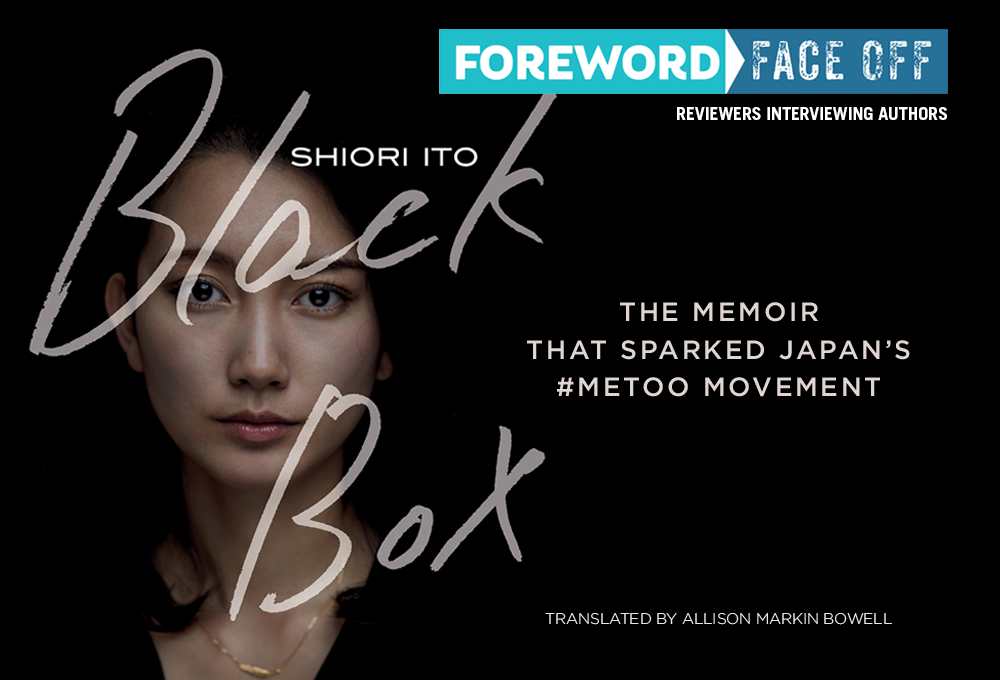Reviewer Kristine Morris Interviews Allison Powell, Translator of Shiori Ito’s Black Box: The Memoir that Sparked Japan’s #MeToo Movement

This week’s interview takes us to Japan, though its topic is decidedly less cheerful than the Tokyo Summer Olympics currently enrapturing that country and the world.
Back in 2015, Shiori Ito was beginning her journalism career after an adventurous globetrotting internship with Reuters. Seeking mentorship, Shiori had dinner one night with a respected Japanese reporter—who proceeded to drug and rape her. We’d like to report that Japan’s legal system stepped up to efficiently prosecute the brutal crime because plenty of forensic evidence convincingly identified her rapist, but no, Shiori’s case fell apart due to technicalities.

What she did next shocked her country and confirmed the power of books can change the world.
Black Box: The Memoir that Sparked Japan’s #MeToo Movement is “unforgettable as it exposes how patriarchal cultures and codes of silence deprive rape victims of justice,” writes Kristine Morris in her review for the July/August issue of Foreword.
We asked Kristine to connect with translator Allison Powell for insight into how Shiori fought Japan’s deep-seated sexism and won a major victory for female victims everywhere.
Allison, your translation of Shiori Ito’s book, Black Box, was superb. Would you please share with our readers a little of your background, and what brought you to translation?
Thank you so much! I started studying Japanese as a freshman in college—it was a relatively arbitrary decision in that I had no connection with Japan or Japanese culture, I just enjoyed learning languages. But I was a Comparative Literature major (with French as well) and I was always interested in literary translation. I did a study abroad and then spent another year there before entering graduate school, where I studied modern Japanese literature. I’ve been working as a full-time freelance literary translator for years now. I worked in publishing for many years, because I wanted to understand the industry—who was making the decisions about which books would get translated into English, and who would translate them.
What are the difficulties of interpreting Japanese language and culture for an English-speaking audience?
Translating any language and culture for an English-speaking audience is challenging, but specific to Japanese, there is a tremendous amount of cultural information embedded in the structure of the language itself, so that simply translating the words often doesn’t convey the full meaning of the original. And very often, it’s what isn’t said that is almost as important. The syntax of Japanese and English are quite different, which presents various difficulties. And English demands a certain degree of exactitude, whereas Japanese gets away with less specificity.
Do you translate languages other than Japanese?
No, I only translate from Japanese to English. I do still read French, and if a French translation of a Japanese book exists, sometimes I will use it as a reference when I’m translating into English.
How were you chosen for the translation of Black Box, and what did you bring to the project that made you such a good choice?

I was already aware of Shiori and her book, so when the Japanese publisher decided they wanted to sell the international rights for Black Box and they asked me to do a sample translation, I jumped at the chance. At that same time, it just so happened that Shiori was passing through New York and we were able to meet in person. I am a member of the collective “Strong Women, Soft Power,” with two other women who translate from Japanese, and our objective is to promote the translation of women writers in Japan. So I had already been doing advocacy around that, and Shiori’s book and message have a very specific urgency. It’s an honor and a privilege to have translated Black Box.
Having grown up in the United States, do you see any real differences between the way the US teaches youth, especially girls, about the possibility of such assaults and the way Japan deals with the situation? And are there differences in the way rape cases are handled?
Yes, there are major differences in the way people learn about assault and how such trauma is handled, and I think Black Box elucidates many of those by explaining the process and procedures that Shiori was subjected to. There are severe problems that exist in both countries, with the way we conceptualize consent and violations of it that result in assault. People are talking about things more and in different ways since the #MeToo movement took off in 2017, but there is still a long way to go both here and in Japan. Importantly, though, I think the passages in Black Box that describe chikan—public groping, almost always of young girls and women—and its matter-of-fact inclusion within society are searing in the way that they interrogate a phenomenon and the seeds it sows regarding sexuality, consent, assault, and accountability.
What is your next translation project?
I’m working on volume two of a mammoth project, Lady Joker by Kaoru Takamura, which is a co-translation with Marie Iida. Volume one was published earlier this year, and volume two will be out next year. I’m also working with the writer Kanako Nishi on several projects.
Thank you, Allison, for your wonderful translation of Shiori Ito’s powerful book, Black Box. And a word of thanks to Shiori for her courage in taking a stand on behalf of the women and girls of Japan—and, by extension, globally. My hope is that the book will reach those who most need it, and that its message will lead others to speak out and to join the effort to put an end to violence against women and to the social structures that facilitate it.
Kristine Morris
